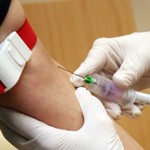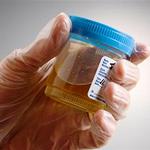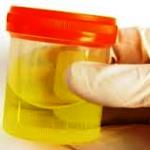 Collection of urine according to Zimnitsky
Collection of urine according to Zimnitsky
To study the excretory and concentration ability of the kidneys, a Zimnitsky test is performed. Such a diagnostic procedure is prescribed for patients with kidney pathology, as well as for diseases of the cardiovascular system (IHD, hypertension) and the endocrine system (diabetes mellitus). Proper collection of urine according to Zimnitsky ensures the reliability of the result of the study. The main task of the nurse is to educate the patient in the preparation and conduct of urine collection for analysis.
All urine excreted by patients within 24 hours should be collected in prepared containers.
Equipment
8 clean and dry glass jars or plastic containers with a capacity of 200-300 ml, labeled with the serving number:
- No. 1: from 6.00 to 9.00
- No. 2: from 9.00 to 12.00
- No. 2: from 12.00 to 15.00
- No. 4: from 15.00 to 18.00
- No. 5: from 18.00 to 21.00
- No. 6: from 21.00 to 24.00
- No. 7: from 24.00 to 03.00
- No. 8: from 03.00 to 06.00
2-4 additional cans (containers).
Patient education
We create a trusting and confidential relationship with the patient.
We explain the purpose of the study and the need to observe the usual diet, water-salt regimen and physical activity.
We explain the preparation and conduct of urine collection in Zimnitsky per day:
- At 6.00 the patient must empty the bladder - urinate into the toilet.
- Next - collect all the urine in 8 containers, which are painted by the hour. Every 3 hours - a new jar (container).
- If at the end of the three-hour period, urination has not occurred, the container should remain empty.
- If in 3 hours the amount of urine exceeded the volume of the jar, the remaining urine is collected in an additional jar and marked with the number and time.
- We warn the patient that at night a nurse will wake him up in a hospital collect urine along Zimnitsky on an outpatient basis, we warn you about the need to set an alarm for 24.00, 03.00 and 06.00.
Be sure to teach the patient to take into account the fluid taken per day. This will ensure the correct accounting of the water balance.
On an outpatient basis, we explain to the patient where and at what time jars (containers) with collected urine should be brought.
In a hospital environment, we provide timely delivery of the material to the laboratory.






